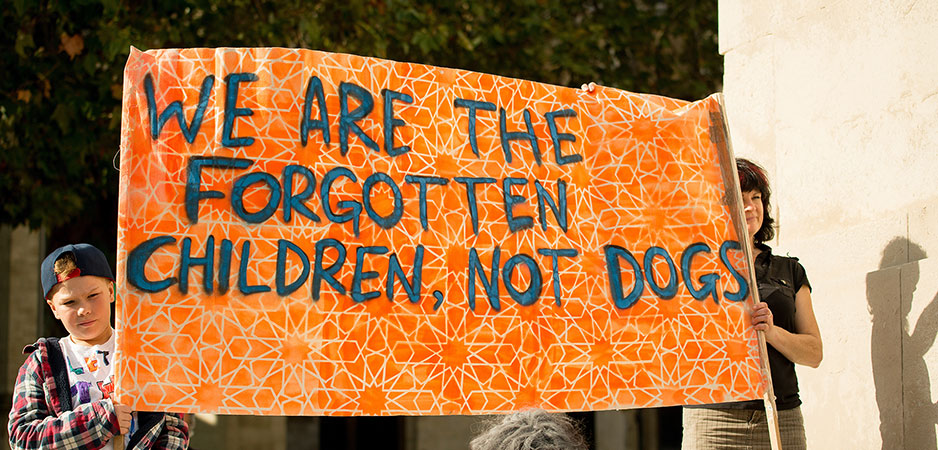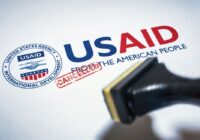While celebrating the contribution of refugees, we must acknowledge the importance of all who are driven from their homelands not only by fear and terror, but also by desperate need. Human bridges and personal connections have been built by great movements across the globe as people escape war and persecution, hunger both for food and opportunity, and from the destructive impact on their environments of increasing inequality and climate change.
These are the consequence of the relentless past and present exploits of the rich and powerful searching for land, treasures and people to exploit, through colonization, invasion and war. Today, this push is costing so much to those living carefully, in sensitive parts of our planet, and who have so much less, trying to maintain a delicate balance with nature — learned from centuries of experience but undermined by the greed of others far away.
Great Waves
Great waves of migration have built the complex and dynamic fabric of countries across the world. Those waves have often been generated by exploitation and cruelty: the Atlantic slave trade or the entrapment of people through bonded and indentured labor, like the Indians who came to South Africa to work in the sugar fields. Those migrants, whatever the reason behind their movement, contributed to building the infrastructure of their new societies, like the Irish diaspora who fled intense poverty and famine to build roads and canals in the UK, the US and Australia, or the Chinese migrants who built the railways across the United States.
The Irish fled poverty and unemployment created by centuries of colonial exploitation by the British. They waited on the backstreets of north London for building work, facing blatant, unashamed racism in the form of discrimination in housing — “No Irish, dogs or blacks” — no real workers’ rights or protection from accidents. Those now leaving Ireland for work are more likely to be IT specialists from the burgeoning software industry benefiting from an education system that invests in skills.
The postwar flowering of modernist design and architecture in the UK was enriched by emigres and refugees fleeing fascism in Germany and occupied Europe. Take, for instance, the influence on ceramics by the brilliant modernist potter and teacher Dame Lucie Rie, who left Austria in 1938 to escape the Nazis and found refuge in London.
Or think of the production design of the Bond movies and the iconic Stanley Kubrick films, including the war room in “Dr. Strangelove,” and the exquisite and lyrical evocation of the British aristocratic life in “Barry Lyndon,” all designed by Jewish refugee Sir Ken Adams, who left Berlin in 1934 and became a fighter pilot for the Royal Air Force. He inspired the imagination of so many children with the creation of the star of “Chitty Chitty Bang Bang” — the car. Transport treasures were designed by Czech Jewish refugee Tom Karen, who left his home in Brno at the age of 13 and designed the beloved Raleigh Chopper children’s bicycle.
The building of Britain’s national treasure, the National Health Service (NHS) has been on the shoulders of nurses from the Caribbean, many arriving during the Windrush years following World War II, and whose children subsequently suffered under the cruel injustices of the “hostile environment,” a Tory government policy that tried to deny thousands of innocent people who had grown up in the UK their rights as British citizens. Expert doctors and health workers have also joined the United Kingdom from across Africa, India, Bangladesh and many other countries near and far. The iconic Finsbury Health Center was designed by Berthold Lubekin from Georgia.
Postwar reconstruction required labor and skills in abundance. The flagship showcase in the great celebration of the new world of peace and growth, the Festival of Britain and the Royal Festival Hall, were designed by the London County Council as a project for the public good. It brought together talented young architects, including German-born Peter Moro, who arrived in London in 1936, penniless and unable to speak any English.
The 2012 London Olympics showcased the glorious undulating swimming pool, whose architect, Zaha Hadid, came to the UK from Iraq as a student and became one of the most revered architects in the world. The ArcelorMittal Orbit built to view the site games, designed by Indian-born artist Anish Kapoor, who became the first living artist to have a solo exhibition at the Royal Academy of Art in London.
It is the same story across the world. In the United States, the Smithsonian Museum and the National Mall in Washington were designed by the Ghanaian-British architect Sir David Adjaye, who also designed the Holocaust Memorial and the learning center planned for Westminster.
Global Citizens
This year, Refugee Week takes place during an unprecedented crisis that highlights our connectivity and the importance of open borders. In the UK, over 20% of health workers are from a black, Asian, minority ethnic (BAME) background. We now know that those from BAME communities are at increased risk from COVID-19. According to a study by The Guardian, six in 10 of the 200 NHS staff who died from the disease by end of May came from BAME communities.
The skills and talents of global citizens have built, changed and enhanced our cities and our lives. We all gain from those who bring us skills, talents and determination along with their suitcases from around the world. And it also makes economic sense. According to the Refugee Council, some 1,200 medically-qualified refugees are on the British Medical Association’s list. While it costs around £25,000 to support a refugee doctor to practice in the UK, training a new doctor costs between £200,000 and £250,000.
The Refugee Council hosts the important project, Building Bridges, which works with UK mentors and runs training that will help refugee doctors learn not only the language, but also the subtle nuances of the NHS that will allow them to add vital resources to the struggling system. This has never been more important than now, with the COVID-19 crisis illustrating so vividly the exceptional contribution made by refugees and migrants to our health and care services.
Without their talent, courage, dedication and expertise, Britain’s health and care systems would have collapsed, yet many of the staff working under certain restrictions have had to fight to ensure that they can access the very health system they are sustaining. A heroic struggle has been led by a Syrian refugee and filmmaker Hassan Akkad, volunteering for a vital job cleaning hospitals during the pandemic, who, along with many others, was threatened with a ruling that meant he would have to pay for access to health care in a system designed to be free at the point of need for all. His courageous and powerful testimony ensured that this inequity was scrapped for all health workers.
Refugee Week celebrates our global common citizenship and offers us all opportunities to learn more about what is given by those who have to sacrifice their homelands to seek peace, freedom and the chance to build bridges. It also gives us a chance to understand the profound challenges that refugees and migrants experience — so often denied rights, impoverished and humiliated, facing the risk of being imprisoned indefinitely under Britain’s current immigration rules.
The Gatwick Detainees Welfare Group not only visits and sustains those unjustly detained at the Gatwick detention center, but has organized inspiring walks over the last five years with those who have experienced unjust detention to highlight this injustice and to campaign to end indefinite detention. They have worked so hard to bring in new supporters, working with brilliant writers like Patrick Gale, Ali Smith, Kamila Shamsie and Gillian Slovo (a child refugee from apartheid South Africa herself), musicians like Ibrahim Aziz, and various artists. This year’s will be a virtual event with the theme of building bridges. All global citizens can participate, walking wherever they are and sharing their experience by joining the online events at Refugee Tales with other supporters and survivors of unjust detention.
Without the skills of those who make such sacrifices and endure so much to leave their countries of birth, the NHS would be unable to cope, and creativity in design, music, art and architecture would be weakened. All of us as global citizens would pay the price of this evisceration in every aspect of our lives. This Refugee Week there is so much to celebrate, so many heroes to honor, but also so many more battles that must be fought if we are to keep building vibrant bridges of love, trust and respect.
*[Correction: This article previously referred to Sir David Adjaye as Ghanaian-Tanzanian. Updated on June 16, 2020, at 17:50 GMT.]
The views expressed in this article are the author’s own and do not necessarily reflect Fair Observer’s editorial policy.
Support Fair Observer
We rely on your support for our independence, diversity and quality.
For more than 10 years, Fair Observer has been free, fair and independent. No billionaire owns us, no advertisers control us. We are a reader-supported nonprofit. Unlike many other publications, we keep our content free for readers regardless of where they live or whether they can afford to pay. We have no paywalls and no ads.
In the post-truth era of fake news, echo chambers and filter bubbles, we publish a plurality of perspectives from around the world. Anyone can publish with us, but everyone goes through a rigorous editorial process. So, you get fact-checked, well-reasoned content instead of noise.
We publish 2,500+ voices from 90+ countries. We also conduct education and training programs
on subjects ranging from digital media and journalism to writing and critical thinking. This
doesn’t come cheap. Servers, editors, trainers and web developers cost
money.
Please consider supporting us on a regular basis as a recurring donor or a
sustaining member.
Will you support FO’s journalism?
We rely on your support for our independence, diversity and quality.






